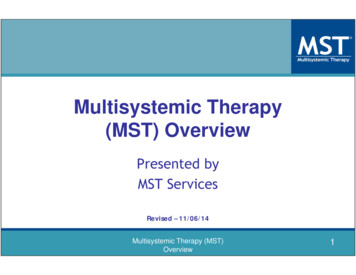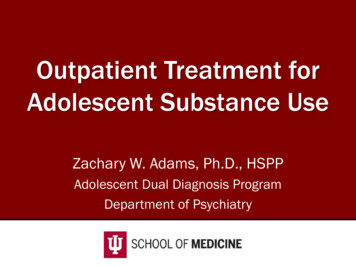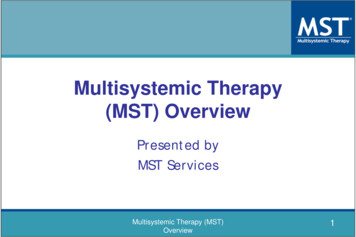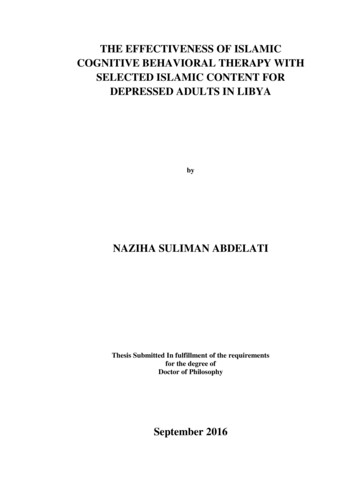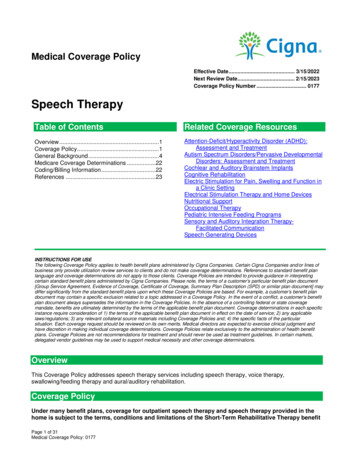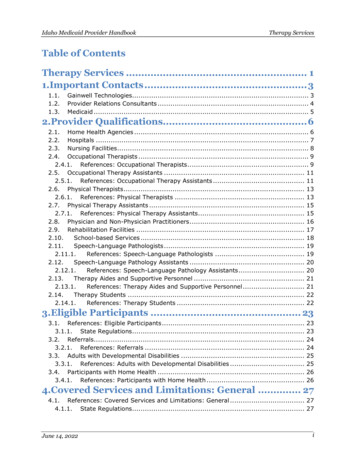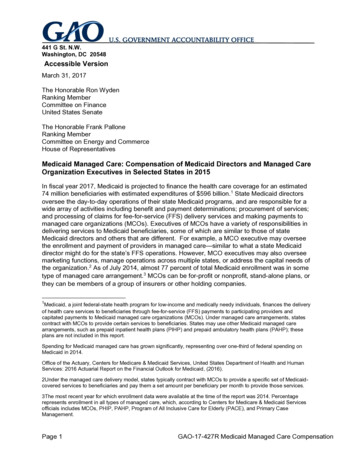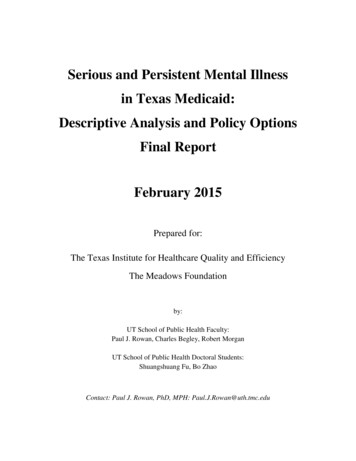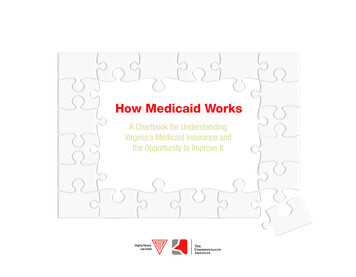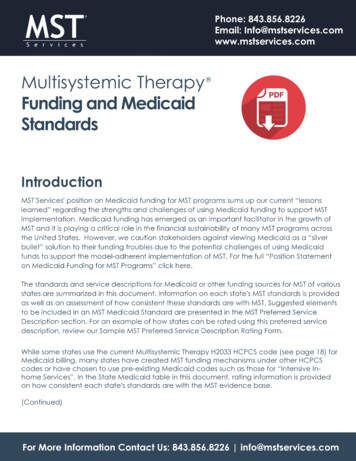
Transcription
dStandards lickhere. sisprovidedaswellasanassessmentofhow mpleofhow on,review While some states use the current Multisystemic Therapy H2033 HCPCS code (see page 18) forMedicaid billing, many states have created MST funding mechanisms under other HCPCScodes or have chosen to use pre-existing Medicaid codes such as those for “Intensive Inhome Services”. In the State Medicaid table in this document, rating information is providedon how consistent each state's standards are with the MST evidence 6.8226 info@mstservices.com
Multisystemic TherapyFunding and MedicaidStandardsIntroduction(Continued)These state Medicaid standards are rated by placing them in one of four catego ries (i.e.,Highly Consistent, Co nsistent, Mostly Consistent, o r Minimally Co nsistent) by comparing them tothe list of recommended program practices and requirements presented in the MST PreferredService Description document. These recommended program practices and requirementshave been developed to replicate the characteristics of clinicians, training, clinicalsupervisio n, co nsultatio n, monitoring and program support provided in the successful clinicaltrials of MST and have been refined through extensive experience with MST programreplications throughout the United States and in growing a number of sites internationally.The goals of MST programs include providing clinically effective, family-based services withhigh levels of provider accountability for outcome. Thus, the functional mission and currentservice array of the MST host agency must be examined for compatibility with the MSTtreatment appro ach. The Success of MST depends on the provision and proper managementof these necessary resources.For those individuals interested in assistance with RFP develo pment, please refer to Draft MSTRFP Template. This is helpful in writing an RFP as it contains the elements that should beincluded in the RFP for MST.For technical assistance in developing funding or Medicaid standards for MST, please contactMelanie Duncan, Project Manager, at melanie.duncan@mstservices.com.For More Information Contact Us: 843.856.8226 I info@mstservices.com
dStandardsTableofContents StateMedicaidTable-pages19 ages1011 MSTPreferredServiceDescription-pages1214 SampleMSTPreferredServiceDescriptionRatingForm -pages151725 MSTH2033HCPCScode-pages18- tactUs:843.856.8226 info@mstservices.com
MST State Medicaid TableSTATE /COUNTYSERVICEDESCRIPTIONMEDICAID /FUNDINGSTANDARDLEVEL OFCONSISTENCYW/ MSTEVIDENCEBASEAlabamaNo MSTstandard hasbeen identifiedAlaskaNo licensed MSTN/Ahjhjhjkhjkteams operatingArizonaPUBLISHED RATEINFORMATION* (seefootnote about activitiesallowed for billiing)N/AADDITIONAL INFORMATION/COMMENTSN/AN/AConsistent This standard isconsistent withthe MSTThe acceptedevidence basedefinition of MST due to therequirement thatis:the "contractorArizonawill implementMultisystemicthe MST serviceTherapyin strictProgramadherence to theBlueprintsDescriptionProject MSTmodel".This state standard is silent in manycritical areas including, qualityassurance practices and stafftraining, program staffing andprogram operational requirements.The main strength is therequirement of implementation to bein strict adherence to the BlueprintsProject MST model.AZ - MST ServiceDescription RatingArkansasNo licensed MSTN/Ateams operatingCaliforniaCopy of standardnotobtained OutpatiN/Aent MentalHealth Services Medi-CalN/ANot Consistent This standardColoradoCO MSTdoes not provideMedicaidadequateStandardFederal H2033MultisystemicTherapyspecification ofthe MSTmodel. CO MST ServiceDescriptionNo published state-wide rate.Each provider negotiatesrates with each BHO.This standard fails to provideadequate specification of theservice to insure adherentimplementation of the MST modeland gives almost no guidanceregarding critical implementationrequirements and target populationcriteria.RatingMST Funding and Medicaid Standards - Page 1
MST State Medicaid TableCT Draft MSTConnecticut MedicaidStandardReview underdevelopmentDelawareCopy of standardN/Anot obtainedDistrict ofColumbiaCopy of standardnotobtained CommuN/Anity BasedIntervention(CBI) Level IFloridaNo MSTstandard hasbeen identifiedN/AN/AGeorgiaNo MSTstandard hasbeen identifiedN/AN/AHawaiiMostlyConsistent This standard ismostly consistentwith the MSTevidence base.Fortunately theHI MST systemhas practicestandards thatHI MST MedicaidNo rate publisheddemandStandardadherence to theMST model inareas where thisstandard is silent(e.g. QA, MSTlicensure,etc.). HI - MSTServiceDescriptionRatingIdahoNo licensed MSTN/Ateams operatingN/AIllinoisNo MSTstandard hasbeen identifiedN/AN/AMST Funding and Medicaid Standards - Page 2
MST State Medicaid TableIndianaNo licensed MSTN/Ateams operatingN/AIowaNo licensed MSTN/Ateams operatingN/AKansasNo licensed MSTN/Ateams operatingN/AKentuckyNo licensed MSTN/Ateams operatingN/ALouisianaThe rate for MST ranges 36.01* (minimum for MAlevel therapist) - 30.23*Consistent- This (minimum for BA-leveltherapist) per 15-minute unitstandard isLouisiana Behaviset by LA Medicaid (H2033).consistent withoral Healththe MSTPartnershipevidence base.https://www.lamedicaid.com/p(LBHP) ServiceLA-MST Service rovDefinitionsDescriptionweb1fee schedules/Multi FeeManualRating.pdfThe standard requires that "Theprovider agency must have acurrent license issued by the MSTServices." Almost all recommendedcriteria are specified in standard;however, program financial stabilitymay be an issue due to the fact thatphone and collateral contacts (evenwhen clinically appropriate) havebeen disallowed as a billableactivity.The rate for MST is 31.07*per 15 minute increment aspublished here:MaineHighlyConsistent- Thisstandard isMainecarehighly consistentBenefits Manual:with the MSTBehavioralevidence base.Health ServicesME-MST ServiceDescriptionRatingMarylandMST Medicaidstandard underdevelopmentReview underdevelopmentN/AMassachusettsNo MSTstandard hasbeen identifiedN/AN/AThe Children's Home andhttps://www.maine.gov/dhhs/a Community Based TreatmentServices rule within the Mainecareudit/ ratesetting/documents/S65Behavi Behavioral Services Medicaido ral Health2-23-15.pdfAssistance Program is inclusive ofMST.MST Funding and Medicaid Standards - Page 3
MST State Medicaid TableMichiganMostlyConsistent This standard ismostly consistentwith the MSTevidence baseMI MST Medicaid due to theStandardrequirement thatdocumentthe "Master's1and MI MSTlevel clinicianMedicaidwho is a CMHP,No rate publishedStandardcertified by MSTdocument 2Services", evenFederal H2033though it doesMultisystemicnot provideTherapyadequateMI MICHIGANspecification ofPIHPCMHSPthe MSTPROVIDERmodel. MI-MSTQUALIFICATIONSPER MEDICAIDServiceSERVICES andDescriptionHCPCSCPTCODESRatingWhile most MST criteria are notspecified in this standard should bemet "de facto" as licensure by MSTServices is required. A weakness ofthe rate structure is that is onlydirect services, face-to-face withconsumer or family members arebillable.MinnesotaNo MSTstandard hasbeen identifiedN/AN/AMississippiNo MSTstandard hasbeen identifiedN/AN/AMissouriNo MSTstandard hasbeen identifiedN/AMontanaNo licensed MSTN/Ateams operatingN/ANE MSTMedicaidStandard DocumNebraskaentHighlyConsistent- Thisstandard ishighly consistentwith the MSTFederal H2033evidence base.MultisystemicTherapyNE-MST ServiceDescriptionRatingThe rate for MST is 38.24* per15 minute increment is publishedon page 14 of the documentfound here:The standard requires agency to"be trained and certified in MST asdefined by the institute of MST."Almost all recommended criteria arehttp://dhhs.ne.gov/Documents specified in standard and those not/471-000-532.pdfspecified in the standard, should bemet "de facto."MST Funding and Medicaid Standards - Page 4
MST State Medicaid TableNevadaNo MSTstandard hasbeen identifiedN/AN/ANewHampshireNo licensed MSTN/Ateams operatingN/ANJ Intensive InCommunityMental HealthNew JerseyRehabilitationServices (IICServices)Not ConsistentThis standard isnot specific toMST and isreported to beadministered insuch a way as tohinder thedelivery of MST.NJ-MST ServiceDescriptionRatingThe rate for MST is listed asset according to "contractpricing" as published on page283 of this document.N/Ahttps://www.hdismedicaid.com/files/ NJ%202016.pdfThe rate for MST is 37.50(for Masters, or Higher, Level),Highly- 35.00* (for BachelorsConsistent Level) per 15 minuteThis standard is increment service (underhighly consistent H2033 code), but can benegotiated per provider, aswith the MSTpublished here:NM MSTevidence baseMedicaidalthough it lacksStandard Federalspecifying thehttp://www.hsd.state.nm.us/upNew Mexico 008157f42259exclusionaryTherapy (MST)7cccdccriteria forcode11d2034f0Behavioral HealthstandardFeeMST. NM - MST Schedule Effective 8 1 201Service4 corrected.pdfDescriptionRatingNew YorkNo MSTstandard hasbeen identifiedN/ANorthCarolinaNC MSTMedicaidStandard FederalH2033MultisystemicTherapy (MST)Consistent This standard isconsistent withthe MSTevidence base.WhileN/ANo rate published. Rates arenegotiated with MCOs, no setstate-wide rate.Provider organizations mustdemonstrate that they meet thesestandards by being endorsed by theLME.MST Funding and Medicaid Standards - Page 5
MST State Medicaid Tablecode NC LMEStandardsthis standard isintended to fundthe use of MSTwithin theevidence-basedreferral range ofyouth 12-17years old, it waswritten with abroader agerange of 7- 17 toenable the formalevaluation ofusing MST withyouth down to anage of 7 yearsold in hopes offacilitating furtherdevelopment ofthe MSTevidence base.NC - MSTServiceDescriptionRatingNorthDakotaNo licensed MSTN/Ateams operatingN/AOhioOH IntensiveHome BasedTreatmentServiceDescription Intensive HomeBased Treatment(IHBT) ServiceThis standard isnot specific toMST and has notbeen reviewed.The Intensive Home-BasedTreatment rule is inclusive of MST.OK MST MedicaidStandardFederal H2033MultisystemicTherapyNot Consistent This standarddoes not provideadequatespecification ofthe MSTmodel. OK - MSTServiceDescriptionRatingThis standard fails to provideadequate specification of theservice to insure adherentimplementation of the MST modeland gives almost no guidanceregarding critical implementationrequirements and target populationcriteria.OklahomaMST Funding and Medicaid Standards - Page 6
OregonNo MSTstandard hasbeen identifiedPA olinaN/AMostly Consistent - Thisstandard ismostly consistentwith the MSTevidence base.Fortunately thesystem haspracticestandards to theMST model inareas where thisstandard is silent(e.g. QAcontinued stay,dischargecriteria, etc.). PA- MST ServiceDescriptionRatingN/ARates are negotiated withMCOs, no set state-wide rate.N/AThere are weekly rates forsome providers.No MSTstandard hasbeen identified.N/AAll MST providers are fundedthrough two "Networks" of childserving agencies contracted withthe state Department of Children,Youth, and Families to provideservices to Department-involvedyouth (including juvenilejustice). MST services areMedicaid reimbursable for the statethrough "Costs not otherwisematchable" (CNOM) underthe Rhode Island Global ConsumerChoice, Section 1115(a),Demonstration Waiver.SC MentalHealth ServicesNot Consistent While thisstandard is notspecific to MST it No rate publishedis mostlyconsistent withthe MSTevidenceN/AMST Funding and Medicaid Standards - Page 7
base. Fortunately the SC MSTsystem haspracticestandards thatdemandadherence to theMST model inareas where thisstandard is silent(e.g. QA, stafftraining, etc.). SC- MHS-NOHServiceDescriptionRatingSouthDakotaNo licensed MSTN/Ateams operatingN/ATennesseeNo MSTstandard hasbeen identifiedN/AN/ATexasNo MSTstandard hasbeen identifiedN/AN/AUtahNo licensed MSTN/Ateams operatingN/AVermontNo licensed MSTN/Ateams operatingN/AVirginiaNo MSTstandard hasbeen identifiedN/AN/AThis standardwas establishedState MST Pilot for a specific pilotProject Medicaid project and doesStandardnot provide fullWashingtonspecification ofFederal H2033the MST modeland thereforeMultisystemichas not beenTherapyreviewed.This standard was created for alimited pilot program which does notfully specify the service but doesstate it will fund “MST services asdefined by MST, Inc.”WestVirginiaN/AWashingtonNo licensed MSTN/Ateams operatingMST Funding and Medicaid Standards - Page 8
WisconsinNo licensed MSTN/Ateams operatingN/AWyomingNo MSTstandard hasbeen identifiedN/AN/A* Footnote regarding activities allowed for billing. The range of activities that are ‘Allowable’for billing generally varies greatly state by state and across Managed Care Organizations(MCOs) within states. As a result, the total number of 15-minute units that are billed for asingle case of MST will be dramatically different in accordance to what is allowed to be billedas a reimbursable activity. These differences in the definitions of Allowable / Billable activitiesis a large contributor to why the 15-minute unit rates for MST vary so much across systems.An additional significant contributor to rate differentials is regional variation in staff salaries.MST Funding and Medicaid Standards - Page 9
MST ServicesPosition Statement MemoAuthor(s):Keller Strother and Melanie DuncanDate:06/19/09Topic:Medicaid Funding for MST ProgramsIssue:Strengths and Weaknesses of Using Medicaid Funding for MST ProgramsThe purpose of this position statement is to summarize the “state of the learning” regarding the strengthsand challenges of using Medicaid funding to support MST implementation. Medicaid funding hasemerged as an important part of the MST landscape and is playing a critical role in the financialsustainability of many MST programs across the United States. However, we caution stakeholdersagainst viewing Medicaid funding as a “silver bullet” solution to their funding troubles, due to thepotential limitations and challenges of using Medicaid funds to support the model-adherentimplementation of MST as outlined below.Strengths: Many youth and families who can benefit from standard MST are Medicaid eligible. Medicaid funding allows states to receive partial federal support for their evidence-based MSTprograms. Once a funding standard for MST is added to the state plan, funding is readily available. Medicaid waivers, 1915(b) Managed Care waivers and 1915(c) Home and Community-basedServices waivers, and the 1915(i) Home and Community-Based Services state plan option, can beused to give states the flexibility to structure the funding for MST in the form of a per diem,weekly or monthly, billing rate.Weaknesses: Medicaid funding alone is often insufficient to support an MST program. Under the Rehabilitative Services Option of the Medicaid code (a.k.a.the ‘Rehab’ option),Medicaid funding will never fully sustain an MST program. (See below for more on this topic.) Not all families in need of MST meet the eligibility criteria for Medicaid. The current MST HCPCS (Healthcare Common Procedure Coding System) code available foruse by states is based on a 15-minute billing increment. The nature of this increment, being arelatively short increment of time, is leading systems to establish reimbursement structures basedon client contacts and is encouraging greater administrative/management focus on the billablenature of clinical work in practice settings. (See below for elaboration on each topic.) Under the Rehabilitative Services Option, the Centers for Medicare and Medicaid Services(CMS) is not able to create per diem, weekly or monthly billing rates for MST due to the numberof non-allowable activities that are required as part of implementing MST. (See below for more.) Many Medicaid systems only reimburse for face-to-face contacts and, at times, only contactswith family members when the youth is present. This type of funding structure can easily lead tonon-model adherent practices that over emphasize face-to-face contacts in clinicalimplementation. In MST implementation, a therapist who gets the same high-quality outcomewith less face-to-face contact is doing a better job. A common revenue management practice in fee-for-service Medicaid systems is the use of“productivity” metrics to focus staff on certain activities that are viewed as most appropriate.Many organizations, however, define “productivity” solely on revenue generation (billableactivity) rather than clinical outcomes. In the most extreme examples of this, administrators postlists of “productivity rates” (a.k.a. revenue generation rates) publicly within the agency to shamestaff into engaging in more billable activity. When properly used, “productivity” metrics can beMST Funding and Medicaid Standards - Page 10
used to ensure that therapist activities, as monitored through activity logging, are clinicallyappropriate, model-adherent and are focused on producing better outcomes for clients.No states currently have Medicaid funding available for the MST-Psychiatric adaptation of MST.This can lead to inappropriate referrals to standard MST programs of youth with significantpsychiatric service needs and for whom these psychiatric service needs are viewed as the primarydriver for the youth’s inappropriate behaviors.CMS feedback regarding funding under the Rehab Options:Our understanding of the feedback from staff at the federal offices of the CMS is that the following typesof services and expenses included in the delivery of MST are not allowable and can neither bereimbursed directly nor built into rates for MST under the Rehabilitative Services Option. It is ourestimate that these kinds of activities constitute at least 10%, to over 30%, of an MST program’s annualbudget, depending on the program size, structure, and case-specific service requirements. Five-day MST orientation training Quarterly MST Booster training Ongoing training, work sample review, etc. with supervisor and/or teammates Staff time spent reading relevant clinical material for training purposes or reviewingreference materials General supervision activities, including on-site supervision and case review (The exceptionto this would be the rare situation when the MST client is present.) Administrative functions executed by the Supervisor Face-to-face delivery of marital therapies to adult caregivers without youth present (onlyallowable if issues are directly related to the youth’s behavior or needs) Time spent trying to contact and engage families when “no shows” occur and/or whenoverall commitment to participation in treatment is low Staff meetings and non-clinical discussions “Flex funds” Court appearances Start-up expenses prior to client referrals Services delivered prior to authorization for billingTwo additional areas worthy of comment are phone contacts and collateral contacts. While CMS doesallow these types of activities, they MAY or MAY NOT be allowable in individual states, depending onthe standards established by each state. Phone contacts with caregivers Collateral contacts with significant others that affect the youth including, but not limited to,the neighborhood, social, educational, and vocational environments, as well as those from thecriminal justice, child welfare, health and mental health systems. Phone contacts with collateral contactsConclusions:While Medicaid funding can be a meaningful part of an MST funding strategy, it is seldom a sufficientsource of funding on its own. MST program administrators, operating programs under the RehabilitativeServices Option, consistently report that Medicaid reimbursements can reliably cover about 40% to 60%of a model-adherent MST team’s operating budget. States operating under waivers that grant theflexibility to structure funding for MST in the form of a per diem, weekly or monthly billing rate areoften more successful in using Medicaid to fund a greater proportion, or even all, of an MST program’sbudget. Absent such a waiver, we recommend that MST programs create a multi-faceted funding streamthat “braids” multiple sources of funding at a budgetary level and incorporates the available Medicaidreimbursements with these other sources of funding (e.g., state services funds from juvenile justice,mental health, etc.) in such a way that model adherence and client outcomes are always the primary focusfor every MST clinician and program administrator.MST Funding and Medicaid Standards - Page 11
MST Preferred Service Description / Medicaid / Funding StandardBrief Service Description: Multisystemic Therapy (MST) is a time-limited, intensive family andcommunity-based treatment that addresses the multiple determinants of serious anti-socialbehavior in juvenile offenders. MST addresses the factors associated with delinquency acrossyouths’ key settings, or systems (e.g., family, peers, school, neighborhood). Using the strengthsof each system to foster positive change, MST promotes behavior change in the youths’ naturalenvironment.System Level Practices and Requirements:Requires valid program license with MST Services and the MedicalUniversity of South CarolinaRate structure for MST is a case rate (Per Diem, weekly, monthly, or flatrate) rather than hourly or fractional-hourly rate.Rate structure for MST under the Rehabilitative Services Option allows forreimbursement, either directly or built into the rates, for collateral contactswith significant others that affect the youth including, but not limited to, theneighborhood, social, educational, and vocational environments, as well asthose from the criminal justice, child welfare, health and mental healthsystems.Rate structure for MST under the Rehabilitative Services Option allows forreimbursement either directly, or built into the rates, for phone contactswith caregivers and collateral contacts.Quality Assurance Practices and Requirements:System monitors and tracks the adherence to the MST modelSystem funds the collection of the MST Therapist Adherence Measure (TAM)by an independent third partyStaff Training Requirements (Training includes the following segments administered by MSTServices of Charleston, SC or a licensed MST Network Partner organization):Initial five day orientation trainingOngoing quarterly one and one-half day booster training sessionsOngoing weekly telephone consultationSupervisor Requirements:MST Clinical Supervisors are highly experienced Masters or Ph.D. levelmental health or child welfare professionalsTherapist Requirements:MST Therapists are full-time Masters-level staff, or Bachelors-level staffwith a minimum of five years appropriate clinical experience, in mentalhealth or child welfare servicesMST Therapists are assigned to the MST program solely and have noother agency responsibilitiesMST Funding and Medicaid Standards - Page 12
Program Staffing Requirements:Maintain a supervisory/direct service staff ratio of one supervisor per eachteam consisting of 2-4 full-time therapistsOne supervisor of AT LEAST 50% FTE is assigned to one MST team, orone full-time clinical supervisor to two MST teams. Determination ofsupervisor assignment should be based on the specific context and needsof the program.MST Supervisors carrying a partial MST caseload should be assigned tothe program on a full-time basisBachelors-level staff shall not make up more that 33% of the therapistpositions of an MST team.Program Operational Requirements:MST program is available to clients 24 hour/day, 7 day/week via an on-callsystem staffed by MST team membersDuration of treatment is an average of 4 months with an expected range of3 to 5 monthsMST caseloads do not exceed 6 families per therapists with an averagecaseload of 5 families per therapist over time and a normal range being 4to 6 families per therapistAdmission Criteria (All of the following criteria are necessary for admission):Referral / target ages of 12-17Youth is a chronic or violent juvenile offenderChild is at risk of out-of home placement or is transitioning back from anout-of-home settingExternalizing behavior symptomatology resulting in a DSM-IV (Axis I)diagnosis of Conduct Disorder or other diagnosis consistent with suchsymptomatology (ODD, Behavior Disorder NOS, etc.)Ongoing multiple system involvement due to high risk behaviors and/orrisk of failure in main stream school settings due to behavioral problemsLess intensive treatment has been ineffective or is inappropriateExclusion Criteria (Any of the following criteria are sufficient for exclusion from this levelof care):Child meets criteria for out-of home placement due to suicidal, homicidal, orpsychotic behavior or are those youths whose psychiatric problems are theprimary reason leading to referral, or who have severe and serious psychiatricproblems.Youth living independently, or youth for whom a primary caregiver cannotbe identified despite extensive efforts to locate all extended family, adultfriends and other potential surrogate caregivers.Referral problem is limited to serious sexual misbehaviorYouth has an autism spectrum diagnosisMST Funding and Medicaid Standards - Page 13
Continued Stay Criteria (All of the following criteria are required for continuing treatment atthis level of care):Treatment does not require a more intensive level of careTreatment plan has been developed, implemented and updated, based onthe child/adolescent's clinical condition and response to treatment, as wellas the strengths of the family, with realistic goals and objectives clearlystatedProgress is clearly evident in objective terms, but goals of treatment havenot yet been achieved, or adjustments in the treatment plan to addresslack of progress are evidentFamily/caregivers are actively involved in treatment, or there are active,persistent efforts being made that are expected to lead to engagement intreatmentDischarge Criteria (The following criteria indicate that the child/adolescent no longer meetsmedical necessity criteria for MST):Child’s documented treatment plan goals have been substantially met,including discharge planIndividual/family no longer meets admission criteria, or meets criteria for aless or more intensive level of careChild and/or family have not benefited from MST despite documentedefforts to engage and there is no reasonable expectation of progress atthis level of care despite treatmentMST Funding and Medicaid Standards - Page 14
Sample - MST Preferred Service Description / Medicaid / FundingStandard Rating FormBrief Description of State System: This funding standard is used by the State Children, Youthand Families Department (CYFD). This service description is rated below by presenting an ”x”for those items met according to the State’s Medicaid requirement .Those items met “de facto”(i.e., in practice) by the providers, as practices required by the system in order to receivefunding, are given a “1” for each item met. An example is the first item below. The state doesnot require a program license as a written requirement in this service definition, but as a matterof practice, all providers must have a valid program license with MST Services in order toreceive funding under this standard. This practice requirement is managed as a part of theCYFD procurement and contract management process (e.g. it is a written requirement is allMST RFP that CYFD issues). All items that require further explanation have a footnoteattached.Brief Service Description: Multisystemic Therapy (MST) is a time-limited, intensive family andcommunity-based treatment that addresses the multiple determinants of serious anti-socialbehavior in juvenile offenders. MST addresses the factors associated with delinquency acrossyouths’ key settings, or systems (e.g., family, peers, school, neighborhood). Using the strengthsof each system to foster positive change, MST promotes behavior change in the youths’ naturalenvironment.System Level Practices and Requirements:1Requires valid program license with MST Services and the MedicalUniversity of South CarolinaRate structure for MST is a case rate (Per Diem, weekly, monthly, or flatrate) rather than hourly or fractional-hourly rate.Quality Assurance Practices and Requirements:1System monitors and tracks the adherence to the MST model1System funds the collection of the MST Therapist Adherence Measure (TAM)by an independent third partyStaff Training Requirements (Training includes the following segments administered MSTServices of Charleston, SC or a licensed MST Network Partner organization):Initial five day orientation trainingOngoing quarterly one and one-half day booster training sessionsOngoing weekly telephone consultationSupervisor Requirements:MST Clin
Medi-Cal N/A Colorado CO MST Medicaid Standard Federal H2033 Multisystemic Therapy Not Consistent - This standard does not provide adequate specification of the MST model. CO - MST Service Description Rating No published state-wide rate. Each provider negotiates rates with each BHO. This standard fails to provide adequate specification of the
